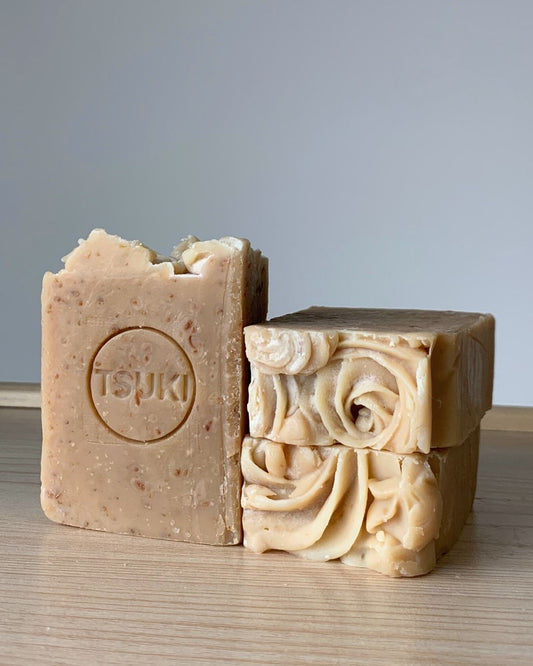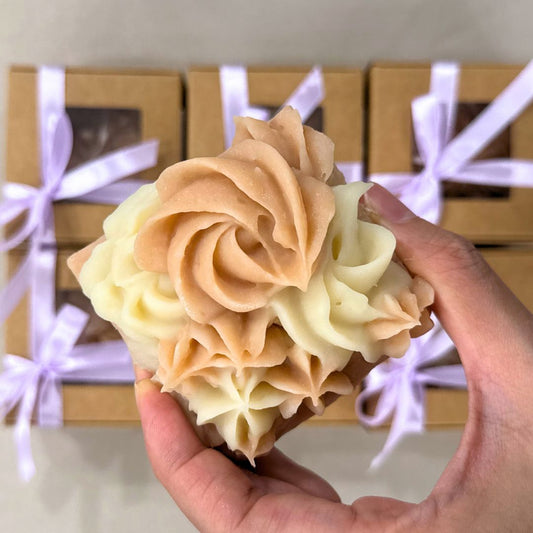Many people wonder what is wrong with just using commercial soap like body washes and body bars. I never knew the difference either!
I’ve have had eczema for most of my life, mostly food intolerances to shrimps, prawn, gluten or touching laundry detergents. On my legs and feet, elbows, with my hands and fingers getting it the worst. I feel you if you’re also a fellow sufferer!
Once, my skin kept breaking out with eczema, drying out and also itching like mad and it really drove me crazy! So of course, I investigated and found the cause before I chopped my own hand off! In the end, I found out it was due to a handwash I had bought on a whim to ‘beautify’ my guest washroom… R E G R E T S. Which brings me to this post – I hope you guys can avoid going through this painful journey like me.
So here are 5 things I wish I had known years ago about commercial soap.
- Soaps are not all true soaps or real soaps
- Detergents dry skin out
- Just because it says ‘handmade’ does not mean it’s a real soap
- Real soaps are very gentle on the skin
- Fragrances in soaps are the most common known irritant

1. Commercial soap might not be true soaps or real soaps
Did you know that the soap you think you are using aren’t even called soaps? This was the most surprising to me! I went to the closest Watsons and looked at all the soaps to verify this.
According to the US FDA, soaps are not allowed to be called soaps unless they are ‘true soaps.’ What is a true soap you must be asking?
According to the FDA, a true soap “must be composed mainly of the “alkali salts of fatty acids,” that is, the material you get when you combine fats or oils with an alkali, such as lye.”(1)
Anything else that doesn’t use this oil/fats + lye method is a synthetic detergent. A DETERGENT! *shook*
If it isn’t a soap, what do companies call the commercial soaps we usually use? Bath bars, body wash, body cleanser, face cleanser, face wash, cleaning bar. Check your own bathroom!
This is why we call our Tsuki Soaps real soap, because all our Tsuki Soaps are made the old fashioned l oil/fat + lye method = true soap. Only real soap here at Tsuki Soap! They are full of skin loving glycerin and with lots of skin loving moisturizing oils like olive oil, rice bran oil, cocoa butter and sunflower oil.

Such dry skin....
2. Detergents dry skin out
Are you using a bath product that you feel is drying and you need a lot of moisturizer after your bath? It could be due to you using a commercial soap that is more detergent than soap! Detergents strip our natural oils and dry skin out because they are made to wash oils and dirt away.
One popular detergent that is a known irritant is Sodium Lauryl Sulfate (SLS) with many studies showing that it can cause ‘redness, sensitivity, dryness, flaking, or a ‘tight’ feeling.’ (2) If you have sensitive skin, try checking if your bathtime routine includes this in its ingredients!
However, not all soaps or synthetic detergent (syndet) soaps are equal. Some syndet soaps are very gentle and are made specifically for sensitive skin, so use it if you must! Even babies up to 2-3 years are advised not to use true soaps, but are recommended to use syndets. (But do check the labels and test before using!)
3. Just because it says ‘handmade’ does not mean it’s a real soap
“Handmade” just means made by hands, but that does not mean that it was made with the the oil/fat + lye method.
There are methods that include ‘melt and pour’ soaps where a base soap is melted and then fragrances, perfumes or other ingredients added to it, and then it hardens into a soap as it cools.
Not all soap bases used for ‘melt and pour’ are made with true soaps. Some are made with SLS included in the soap. In those cases, using a handmade soap will not help our skin at all! Do read the ingredient labels before buying!
At Tsuki Soap, we don’t use any commercial melt and pour soap bases, but make all from scratch the old fashioned way to get true soap!

Real soap is gentle and clean!
Photo by Matthew Tkocz on Unsplash
4. Real soaps are very gentle on the skin
Real soaps made with well-formulated recipes help to provide a gentle wash, not stripping the natural skin oils but using deliciously moisturizing oils to protect the skin too.
Additionally, real soaps are full of glycerin, naturally produced in the soap making process and is a natural moisturizer.
You can learn more about why our real handmade soaps, or true soaps are great for skin in my blog post here.
5. Fragrances in soaps are the most common known irritant
According to studies, “fragrance ingredients are also one of the most frequent causes of contact allergic reactions” And affects those with eczema more! (3)
Yes, in my own terrible experience with the hand wash that killed my hands, it was full of fragrance – I was trying to ‘beautify’ my washroom remember? I didn’t realise how common and allergen perfumes and fragrances are! If you find that you are having skin issues, do try soaps that don’t contain any added perfumes or fragrances.
Our Tsuki Soaps are all made without synthetic perfumes and fragrances, but only with essential oils. However, essential oils also cause irritation in some people and especially essential oils like clove and cinnamon. So do check out our unscented Tsuki Soaps that have no added essential oils – like our Honey Oat soap!
Try one of our real Tsuki Soaps today! They are nothing like the commercial soaps you find in the shops!





